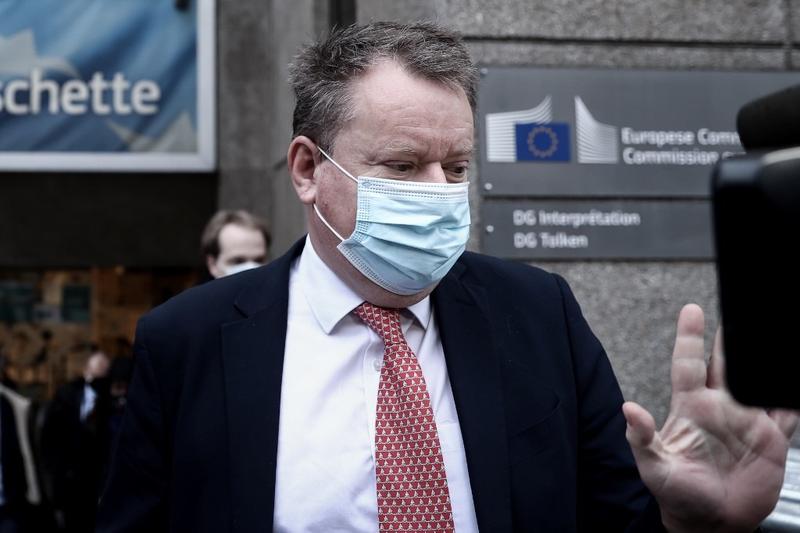 Britain's chief Brexit negotiator David Frost leaves a meeting with European Commission's head of Task Force for Relations with Britain in Brussels on December 7, 2020. (KENZO TRIBOUILLARD / AFP)
Britain's chief Brexit negotiator David Frost leaves a meeting with European Commission's head of Task Force for Relations with Britain in Brussels on December 7, 2020. (KENZO TRIBOUILLARD / AFP)
BRUSSELS/LONDON - British and European Union negotiators made a last-ditch effort on Monday to bridge stubborn differences standing in the way of a post-Brexit trade deal, but they had at best 48 hours left to avoid a disorderly parting of ways at the end of this month.
“EU-UK negotiations have entered the endgame, time is running out quickly,” said an EU diplomat after the bloc’s chief negotiator Michel Barnier gave member states’ envoys to Brussels a downbeat assessment of the state of play. “It is for the UK to chose between ... a positive outcome or a no deal outcome.”
Irish Prime Minister Micheal Martin, whose country would be the hardest hit of the 27 EU states if there is no trade accord, put the chances of a deal at 50-50. Investment bank JPMorgan said its odds on a no-deal had risen to one third from 20 percent
With growing fears of “no-deal” chaos after London finally leaves the EU’s orbit on Dec 31, talks resumed before British Prime Minister Boris Johnson and European Commission President Ursula von der Leyen review the situation in a call at 1600 GMT.
Irish Prime Minister Micheal Martin, whose country would be the hardest hit of the 27 EU states if there is no trade accord, put the chances of a deal at 50-50. Investment bank JPMorgan said its odds on a no-deal had risen to one third from 20 percent.
The British pound tumbled on concerns that there would be no agreement covering annual trade worth nearly US$1 trillion.
Barnier told members of the European Parliament in a separate briefing that negotiations could go on until Wednesday, but no further, Ireland’s RTE news said.
EU diplomats said the ball was now in Johnson’s court.
ALSO READ: Last-ditch push to Brexit deal starts with recriminations flying
“People need to understand that the British are playing with fire here and the fire can burn everybody and that’s something we should all try to avoid,” said Mairead McGuinness, Ireland’s commissioner in the EU executive.
However, the Sun newspaper reported that Johnson, a figurehead for Britain’s campaign that led to a ‘vote leave’ victory in a 2016 referendum, was ready to pull out of the talks within hours unless Brussels changed its demands.
In London, a lawmaker in Johnson’s governing Conservative Party said France would have to make concessions on fishing, and the EU would have to drop what he said were new demands on fair competition known as the level playing field.
High risk for economies
Britain, which joined the EU in 1973, formally left the bloc on Jan 31 but has been in a transition period since then under which rules on trade, travel and business remain unchanged.
For weeks, the two sides have been haggling - as yet without a result - over fishing rights in British waters, ensuring fair competition for companies and ways to solve future disputes.
Failure to secure a deal would clog borders, upset financial markets and disrupt delicate supply chains across Europe and beyond as the world tries to cope with the vast economic cost of the COVID-19 pandemic.
READ MORE: EU-UK trade deal hangs in the balance with four weeks to go
With just days left for a deal to be agreed, EU diplomats said it was a decisive moment for both the United Kingdom and the bloc which built the ruined nations of Europe into a global power after the devastation of World War Two.
In a move that could further undermine the talks, the British government will press ahead with draft laws this week that would breach London’s earlier divorce treaty with the bloc.
Junior Foreign Office Minister James Cleverly said on Monday the clauses that breach the treaty would be re-inserted.
READ MORE: UK prepares for national deployment of virus vaccine


